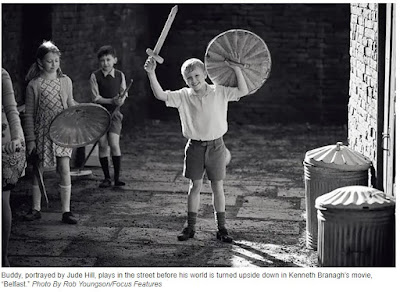Nov. 6, 2022, column from the Amarillo Globe-News:
'Belfast,' 'Derry Girls' illustrate times of Troubles in Northern Ireland
By Mike Haynes
Since the
Reformation, most of the countries of Europe have been split at one time or
another between Catholic and Protestant. Martin Luther kicked off the divide
when he posted his 95 complaints about the Roman Catholic Church in 1517 in
Germany, and people for centuries after were jailed, exiled, burned or beheaded
– by both sides – for not having the correct beliefs.
One of the
modern periods of conflict that continued the discord was the Troubles, about
30 years of violence from the 1960s to 1998 that brought fear and uncertainty
to the people of Northern Ireland.
The Troubles weren’t entirely a Catholic-Protestant thing; the causes of the strife also included longstanding political and cultural tensions between the Irish and the English.
But to grasp
the effect of the Troubles on the men, women, boys and girls of Northern
Ireland, two recent bits of pop culture have enlightened me and my usual movie
and TV partner, my wife, Kathy.
The birth of
friction between Northern Ireland and England followed the invasion of England
by the Normans and William the Conqueror in 1066. About a century later, the
British found their way to Northern Ireland with settlers establishing
themselves there and making that corner of the Emerald Isle much more English
than the rest of Ireland.
Fast-forward
to the 1960s, and the native Irish there, mostly Catholic, were pushing back
against those who had become Protestant and against the British soldiers who
patrolled the streets to keep order. The British ruled Northern Ireland, but some
supporters of independence became violent. Bombings were done by both sides in
the largest city, Belfast, and in Londonderry, or Derry.
In 1972,
British soldiers shot at Catholic protesters, killing 14, in an incident that
became known as Bloody Sunday. In 1979, Queen Elizabeth II’s cousin, Lord
Mountbatten, was killed along with three others in a bombing of his small boat.
The Troubles
continued with about 3,600 people killed until 1998, when politicians finally
brokered the Good Friday Agreement that ended hostilities.
That’s a
too-brief historical outline of the Troubles. But to understand the culture of
the time, the attitudes of ordinary people and how the uneasiness seeped into
daily life, literature can assist us. And sometimes movies rise to the level of
great literature.
Kenneth Branagh’s 2021 film, “Belfast,” fits that category. The young boy Buddy, based on Branagh’s 1960s childhood in the city, sees violence in his own neighborhood, his dad being intimidated by young activists, barricades in the streets and a store being ransacked. His mother and dad, tied to Belfast by a long family history, talk about leaving for a safer life in England. They attempt a normal life, taking the whole family, grandparents included, to see the 1968 movie, “Chitty Chitty Bang Bang.”
Buddy becomes
infatuated with Catherine, a pretty girl at school, but he doesn’t know what to
think when he finds out her family is Catholic. His is Protestant. Buddy’s dad
eventually tells him that if she’s a good person, whether Catholic or some
other religion, she’s welcome in their house.
Trying to
make sense of the violence, Buddy asks, “Was that our side that done all that to
them Catholic houses in our street, Daddy?” Also trying to make sense of it,
his dad replies, “There is no our side and their side in our street. Or there
didn’t used to be, anyway.”
Kathy and I
both put “Belfast” on our lists of all-time favorite movies.
And you also
can get some perspective on Northern Ireland from a sitcom. “Derry Girls” on Netflix
has finished three seasons about four schoolgirls and a guy who live through
the 1990s period leading up to the Good Friday Agreement. Because of some
pretty raunchy language – Irish versions of teenage cussing – we can’t
recommend it for everybody. But even in silly comedy episodes, the attitudes of
Derry kids, parents and neighbors about the Troubles come through.
The one male member of the group, James, is English, and he comes in for verbal abuse about his accent and for being, well, English. He’s loyal to his friends, though, and dresses as an angel as the girls do for Halloween – although everyone else thinks they’re swans.
British
soldiers with machine guns patrol the streets as the Derry girls take abuse
from the local shopkeeper who yells at them for complaining that the American
flag he is selling is faded and has the wrong number of stars. The sequence is
in an episode about the visit of U.S. President Bill Clinton in 1995, which
figured into the eventual end of the Troubles.
“Derry Girls”
is hilarious and also gives insight into history that most Americans know
little about.
Northern
Ireland in 2022 is experiencing political controversy about trade at the
borders that observers hope won’t inflame old wounds from the Troubles that
were thought to be healed. Working people and families certainly don’t want to
return to the days that Irish band U2 sang about in 1983’s “Bloody Sunday”:
“Broken
bottles under children’s feet, Bodies strewn across the dead-end street.”
Bono and
other U2 members hoped that the good news of the God who both Catholics and
Protestants worship would prevail forever:
“The real
battle just begun (Sunday, Bloody Sunday), To claim the victory Jesus won
(Sunday, Bloody Sunday).”




